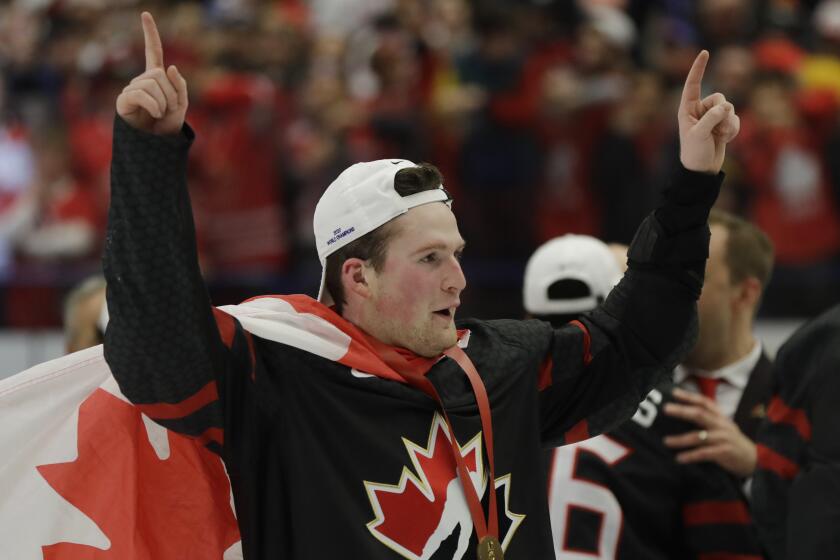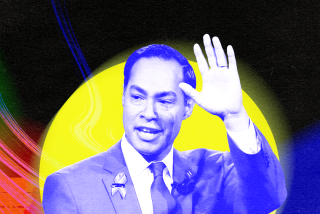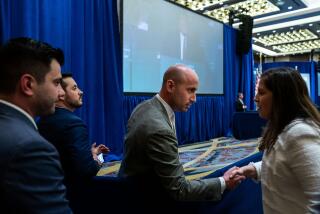Column: Kim Davis and Xavier Gutierrez are working to help diversify the NHL
The question posed to Kim Davis, the highest-ranking Black executive in the NHL, and to Xavier A. Gutierrez of the Arizona Coyotes, who recently became the first Latino president and chief executive of an NHL team, was simple.
How many times during your career have you entered a meeting room and haven’t seen anyone who looks like you? Their responses were sadly predictable.
“There were many moments over the course of 35-plus years in the industry that that has been the case,” said Davis, who worked mainly in finance before she became the NHL’s executive vice president of social impact, growth initiatives and legislative affairs 2 ½ years ago. “I was raised to be strong and to be fearless, so I’m not uncomfortable at being in a room of people that look different than me.
“I think what’s most important is that we create a climate where if you are the only one that you feel comfortable. I think that’s the most important aspect of being one of a few, that you, as a leader — and I’ve always felt this was part of my responsibility — pave the way so that rooms like that continue to improve and look different over time, and I’ve committed my career to that in many ways.”
Gutierrez, who was born in Guadalajara, Mexico, and moved to San Jose when he was 5, was in college when he realized he’d be in the minority in the world of finance. Through a nonprofit called Sponsors for Educational Opportunity, which mentors young people from underserved communities and was backed by Davis while she worked for JPMorgan Chase, he got a summer internship at a Wall Street firm. The experience was life-changing.
Both the Kings and the Ducks have an outside chance of winning a new-look NHL lottery draft, but will either team leap over the Detroit Red Wings?
“My internship class was quite diverse, but when I got to the bank itself I was the only intern of color in my group,” Gutierrez said. “So there were some real interesting conversations — not negative conversations, just interesting about my background and my interests.
“I believe very strongly in the responsibility and obligation that I have to open doors for others to achieve the American dream that I’ve been able to achieve, and to me a large part of that equation has to be in the issues of economic opportunity and economic empowerment.”
Davis and Gutierrez bring valuable new perspectives to a league that’s overwhelmingly white at every level and is beginning to grasp the moral and economic necessity of serving an increasingly multicultural fan base.
The road to enlightenment has had ruts. Although the NHL touts its “Hockey Is for Everyone” initiative as a way to introduce kids to the sport and emphasize inclusion, several Black players were targets of racial comments on the ice and on social media this season. Eager for change, seven current and retired Black players formed the Hockey Diversity Alliance independent of the NHL to fight racism and press for acceptance in the sport and in society.
It was a seminal moment when more than 100 players — including many stars who are white — used social media platforms to decry racism after George Floyd’s death following a Minneapolis police officer putting his knee on his neck for nearly nine minutes in May. Usually reluctant to stand out, they took a strong stand when it mattered. Expect that to continue when (or if) the NHL resumes play, in late July or early August.
“We know our player makeup currently is primarily white,” Davis said, “and so if our players are saying that this is unacceptable, that this is something that we should not stand for, then that is going to make, we believe, our primarily white fan base understand that this is zero tolerance and we have to make room for everyone in our sport for our sport to be successful. Their ally-ship with players of color — who by the way have been saying this for years — is yet another sign of our growth in our sport and the generations of players that understand that this is what our future is going to look like.”
The NHL can’t wipe out racism that’s taught at home. Davis hopes to mitigate it by forming a youth advisory committee and working with hockey organizations in the U.S. and Canada. “We can use our influence as the North Star of the sport of hockey to ensure that we are delivering the message at every level of the ecosystem that we want this sport to be welcoming and that it’s important for the future of our fan base and the future of our sport that that happen,” she said.
Gutierrez lived in Los Angeles for 18 years before his former business partner, Coyotes owner Alex Meruelo, lured him to Arizona. Meruelo, a Cuban American who grew up in Whittier and built an empire that includes four radio stations and KWHY-TV in Los Angeles, shares Gutierrez’s belief Latino sports fans will embrace hockey if exposed to it.
OC Vibe is a 115-acre proposal that layers a community feel atop a district that invites visitors to eat, drink and shop before and after Honda Center events.
Gutierrez became a fan while at Harvard; his three nephews who live in Hacienda Heights fell in love with hockey because the Kings and Ducks pursued young, multicultural audiences. “To this day, I’m struggling at making them Coyotes fans,” Gutierrez said, laughing. “I just had a conversation with Luc Robitaille and told him, ‘I can’t get them to take off your jersey.’ ”
A few months ago the Kings estimated more than 40% of their fan base and nearly a quarter of their ticket-buyers have a Latino background. “Although we have had some success in these initiatives there is still so much work and opportunity in front of us,” Robitaille, the Kings’ president, said via email. “This will continue to be a priority for us and I am excited to engage with Xavier and the Coyotes and see how we can support each other.”
Gutierrez uses the term “fans in waiting” to describe audiences the Coyotes hope to tap through outreach and cultural events. Having him in a decision-making role at the club level and having Davis guide cultural change at the top are a good start for a league that must make inclusion more than a buzzword.
“What I see and what gives me a real positive feeling is that you are starting to see the creation of these pathways to make a change, to diversify the face,” Gutierrez said. “It’s not going fast enough — we always want to see change faster and more in depth and at a greater impact level, but they are happening and I’m very excited that Kim is there.
“I’m very excited that the league office, under the leadership of [Commissioner] Gary Bettman and [deputy commissioner] Bill Daly, are really embracing this and seeing this as the right thing to do, but also the business imperative behind it is truly being embraced.”
Someday, when safety allows the NHL to hold actual meetings instead of virtual gatherings, Gutierrez will walk into a room that’s full of people who share his vision, if not his skin color.
“I’m going to be looking out at my colleagues/competitors in these major markets of Chicago and New York and Florida and even Nashville — who we’re playing in the postseason,” he said, “and if you ask yourself, who is driving the population growth, the business ownership growth, the consumer usage, the labor force participation, it’s these communities of color and in large part a lot of the Latino communities. I think that people see it and it now becomes a question of how to best engage in it and be a part of it.”
More to Read
Go beyond the scoreboard
Get the latest on L.A.'s teams in the daily Sports Report newsletter.
You may occasionally receive promotional content from the Los Angeles Times.








